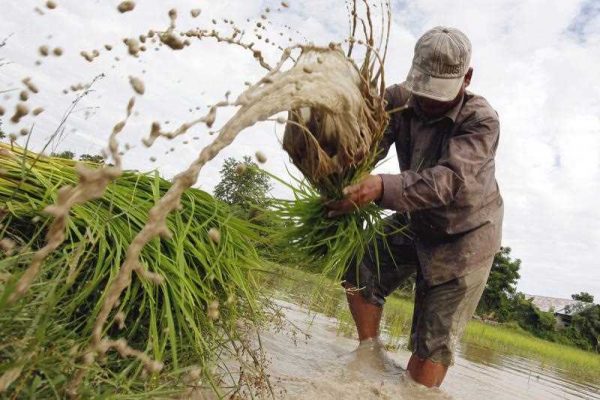International financial institutions, US and European multinational corporations, and both state-owned and private companies in neighbouring Asian countries have been implicated in bankrolling, acquiring and operating ELCs.
In many instances, state authorities and concessionaires ignored the legal requirements for granting ELCs. Environmental and social impact assessments have either been of poor quality or have not been conducted at all. Legally required consultations with affected villagers have not been conducted. ELCs have also been granted in protected forest areas. In 2012 alone, ELCs were granted in more than 270,000 hectares of protected forest areas.
As a result of the rampant allocation of ELCs, 20–30 per cent of Cambodia’s land resources are now held by only 1 per cent of the population, mostly at the expense of the weakest and most marginalised rural people. With a large portion of agricultural land rendered unavailable for local farmers over the next 70 years (the average lease period of ELCs), the food security of future generations of rural Cambodians has been put at serious risk.
The widespread dispossession of local farmers has resulted in an increase in rural poverty and a social transformation of former land possessors into a landless and land-poor semi-proletariat that increasingly depends on selling their labour for their survival.
Protests by the dispossessed peasantry alongside mounting international pressure triggered a moratorium on the granting of new ELCs and a ‘comprehensive review’ of existing ones in May 2012. Prime Minister Hun Sen also instigated an ad-hoc land titling initiative under the so-called Order 01 and gave his second son — a military general — oversight of its implementation.
Order 01 has become synonymous with the prime minister’s ‘leopard skin’ policy, under which individually owned agricultural plots — like the dots in a leopard skin — are located in a wide expanse of ELCs or, less frequently, of state public or communally managed land. Hailed as a success by the government, the impact of Order 01 on tenure security and the livelihoods of its ‘beneficiaries’ remains highly controversial.
Many recipients stated in a 2015 survey by the NGO Forum on Cambodia that some of their plots were not surveyed at all or that they did not receive titles for all the land that had been measured. Conflicts involving powerful actors — military officials or politically well-connected concessionaires — were rarely resolved. Most contentious was the practice in indigenous communities, where potential beneficiaries from individual land titling were told to leave their community and give up their rights to all traditional lands, creating tensions and divisions among community members.
Relief for the landless and land-poor was promised by the government back in 2003. But, the multi-million dollar Land Allocation for Social and Economic Development (LASED) project — which ran from July 2008 to March 2015 with support from the World Bank and German Development Assistance (GIZ) — was plagued with problems: insufficient quantity and quality of land to be distributed, lack of settling-in support and an overly long process (up to six years) from land identification to land distribution. This led to an influx of opportunistic settlers and small-scale ‘land grabs’.
The Cambodian human rights NGO LICADHO found in a 2015 study that many families had already given up their plots. On some of the eight sites more than half of plots had been abandoned. Still, the project has been branded as an overall success by the World Bank and GIZ. And the World Bank is now planning a second phase of the LASED project.
The GIZ has recently pulled out of the land administration sector after more than 15 years of engagement with the Ministry of Land Management, Urban Planning and Construction (MLMUPC) — citing slow progress with nation-wide land reforms as one of the reasons — but may get involved in LASED’s second phase, if the World Bank goes ahead with its plans.
In an apparent attempt to demonstrate his commitment to resolve pressing land issues, Prime Minister Hun Sen recently appointed Chea Sophara as new minister to the MLMUPC. The former governor of Phnom Penh previously served as minister of rural development and has a reputation among international donors and his fellow citizens of being a person who ‘gets things done’.
One of his first actions was to set up a committee to handle the vast number of petitions and complaints lodged by victims of evictions and land conflicts. He also created a new Department for Social Land Concessions to speed up the process of allocating land to landless and land-poor families.
Local and international human rights activists are cautiously optimistic that the initial actions of the new minister signify a major shift in the government’s land policy and are not just part of another pre-election stunt. After all, landlessness in rural Cambodia is not a ‘natural phenomenon’ triggered by population growth and resource scarcity, but is primarily a result of the government’s own land policies.
If it wants to regain the trust of the international community and its own rural constituency, the government would need to revoke all unlawful ELCs, establish an independent judiciary in rural areas that deals with land conflicts in an impartial and low-cost manner, and abolish its recent Law on Associations and NGOs (LANGO), which has been used to harass and intimidate NGOs siding with the dispossessed and marginalised.
Above all, it needs to acknowledge the pivotal role of smallholder farmers as the backbone of a vibrant rural economy rather than as the disposable collateral damage of a continuous process of resource accumulation by a kleptocratic urban elite.
Andreas Neef is Director of Development Studies at the University of Auckland.


So much for agencies like the World Bank or GIZ looking out for the welfare of local residents in a country like Cambodia. Seems like they are in collusion with large multinational corporations and government officials looking to gain control over large tracts of land and thus profit from large scale agri business.